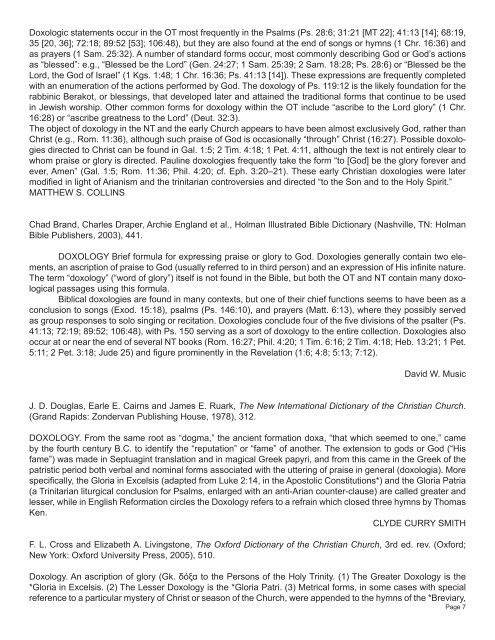Doxologies in the New Testament
Doxologies in the New Testament
Doxologies in the New Testament
You also want an ePaper? Increase the reach of your titles
YUMPU automatically turns print PDFs into web optimized ePapers that Google loves.
Doxologic statements occur <strong>in</strong> <strong>the</strong> OT most frequently <strong>in</strong> <strong>the</strong> Psalms (Ps. 28:6; 31:21 [MT 22]; 41:13 [14]; 68:19,<br />
35 [20, 36]; 72:18; 89:52 [53]; 106:48), but <strong>the</strong>y are also found at <strong>the</strong> end of songs or hymns (1 Chr. 16:36) and<br />
as prayers (1 Sam. 25:32). A number of standard forms occur, most commonly describ<strong>in</strong>g God or God’s actions<br />
as “blessed”: e.g., “Blessed be <strong>the</strong> Lord” (Gen. 24:27; 1 Sam. 25:39; 2 Sam. 18:28; Ps. 28:6) or “Blessed be <strong>the</strong><br />
Lord, <strong>the</strong> God of Israel” (1 Kgs. 1:48; 1 Chr. 16:36; Ps. 41:13 [14]). These expressions are frequently completed<br />
with an enumeration of <strong>the</strong> actions performed by God. The doxology of Ps. 119:12 is <strong>the</strong> likely foundation for <strong>the</strong><br />
rabb<strong>in</strong>ic Berakot, or bless<strong>in</strong>gs, that developed later and atta<strong>in</strong>ed <strong>the</strong> traditional forms that cont<strong>in</strong>ue to be used<br />
<strong>in</strong> Jewish worship. O<strong>the</strong>r common forms for doxology with<strong>in</strong> <strong>the</strong> OT <strong>in</strong>clude “ascribe to <strong>the</strong> Lord glory” (1 Chr.<br />
16:28) or “ascribe greatness to <strong>the</strong> Lord” (Deut. 32:3).<br />
The object of doxology <strong>in</strong> <strong>the</strong> NT and <strong>the</strong> early Church appears to have been almost exclusively God, ra<strong>the</strong>r than<br />
Christ (e.g., Rom. 11:36), although such praise of God is occasionally “through” Christ (16:27). Possible doxologies<br />
directed to Christ can be found <strong>in</strong> Gal. 1:5; 2 Tim. 4:18; 1 Pet. 4:11, although <strong>the</strong> text is not entirely clear to<br />
whom praise or glory is directed. Paul<strong>in</strong>e doxologies frequently take <strong>the</strong> form “to [God] be <strong>the</strong> glory forever and<br />
ever, Amen” (Gal. 1:5; Rom. 11:36; Phil. 4:20; cf. Eph. 3:20–21). These early Christian doxologies were later<br />
modified <strong>in</strong> light of Arianism and <strong>the</strong> tr<strong>in</strong>itarian controversies and directed “to <strong>the</strong> Son and to <strong>the</strong> Holy Spirit.”<br />
MATTHEW S. COLLINS<br />
Chad Brand, Charles Draper, Archie England et al., Holman Illustrated Bible Dictionary (Nashville, TN: Holman<br />
Bible Publishers, 2003), 441.<br />
DOXOLOGY Brief formula for express<strong>in</strong>g praise or glory to God. <strong>Doxologies</strong> generally conta<strong>in</strong> two elements,<br />
an ascription of praise to God (usually referred to <strong>in</strong> third person) and an expression of His <strong>in</strong>f<strong>in</strong>ite nature.<br />
The term “doxology” (“word of glory”) itself is not found <strong>in</strong> <strong>the</strong> Bible, but both <strong>the</strong> OT and NT conta<strong>in</strong> many doxological<br />
passages us<strong>in</strong>g this formula.<br />
Biblical doxologies are found <strong>in</strong> many contexts, but one of <strong>the</strong>ir chief functions seems to have been as a<br />
conclusion to songs (Exod. 15:18), psalms (Ps. 146:10), and prayers (Matt. 6:13), where <strong>the</strong>y possibly served<br />
as group responses to solo s<strong>in</strong>g<strong>in</strong>g or recitation. <strong>Doxologies</strong> conclude four of <strong>the</strong> five divisions of <strong>the</strong> psalter (Ps.<br />
41:13; 72:19; 89:52; 106:48), with Ps. 150 serv<strong>in</strong>g as a sort of doxology to <strong>the</strong> entire collection. <strong>Doxologies</strong> also<br />
occur at or near <strong>the</strong> end of several NT books (Rom. 16:27; Phil. 4:20; 1 Tim. 6:16; 2 Tim. 4:18; Heb. 13:21; 1 Pet.<br />
5:11; 2 Pet. 3:18; Jude 25) and figure prom<strong>in</strong>ently <strong>in</strong> <strong>the</strong> Revelation (1:6; 4:8; 5:13; 7:12).<br />
David W. Music<br />
J. D. Douglas, Earle E. Cairns and James E. Ruark, The <strong>New</strong> International Dictionary of <strong>the</strong> Christian Church.<br />
(Grand Rapids: Zondervan Publish<strong>in</strong>g House, 1978), 312.<br />
DOXOLOGY. From <strong>the</strong> same root as “dogma,” <strong>the</strong> ancient formation doxa, “that which seemed to one,” came<br />
by <strong>the</strong> fourth century B.C. to identify <strong>the</strong> “reputation” or “fame” of ano<strong>the</strong>r. The extension to gods or God (“His<br />
fame”) was made <strong>in</strong> Septuag<strong>in</strong>t translation and <strong>in</strong> magical Greek papyri, and from this came <strong>in</strong> <strong>the</strong> Greek of <strong>the</strong><br />
patristic period both verbal and nom<strong>in</strong>al forms associated with <strong>the</strong> utter<strong>in</strong>g of praise <strong>in</strong> general (doxologia). More<br />
specifically, <strong>the</strong> Gloria <strong>in</strong> Excelsis (adapted from Luke 2:14, <strong>in</strong> <strong>the</strong> Apostolic Constitutions*) and <strong>the</strong> Gloria Patria<br />
(a Tr<strong>in</strong>itarian liturgical conclusion for Psalms, enlarged with an anti-Arian counter-clause) are called greater and<br />
lesser, while <strong>in</strong> English Reformation circles <strong>the</strong> Doxology refers to a refra<strong>in</strong> which closed three hymns by Thomas<br />
Ken.<br />
CLYDE CURRY SMITH<br />
F. L. Cross and Elizabeth A. Liv<strong>in</strong>gstone, The Oxford Dictionary of <strong>the</strong> Christian Church, 3rd ed. rev. (Oxford;<br />
<strong>New</strong> York: Oxford University Press, 2005), 510.<br />
Doxology. An ascription of glory (Gk. δόξα to <strong>the</strong> Persons of <strong>the</strong> Holy Tr<strong>in</strong>ity. (1) The Greater Doxology is <strong>the</strong><br />
*Gloria <strong>in</strong> Excelsis. (2) The Lesser Doxology is <strong>the</strong> *Gloria Patri. (3) Metrical forms, <strong>in</strong> some cases with special<br />
reference to a particular mystery of Christ or season of <strong>the</strong> Church, were appended to <strong>the</strong> hymns of <strong>the</strong> *Breviary,<br />
Page 7

















